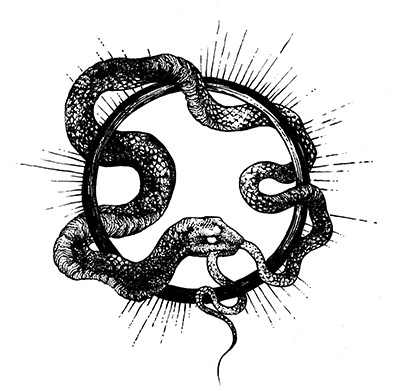I wrote this a couple of years ago, in response to discussions I was having with someone I was mentoring. It is one aspect of what the ouroboros (the ancient symbol depicting the serpent that eats itself) has come to mean to me personally — applied as an approach to living a creative life, and life-as-art.

RECREATION AND THE STRUGGLE TO BLANK
Men of this age, in this Empire of Nothing, have been trained to work for the end.
The weekend, the end of work, the end of life.
Like prisoners who have been promised an hour in the yard, men have been promised that in return for five days of work, they will be released from employment to enjoy two days of “free time.” At work, they must do what the company wants them to do and take care not to say anything that the company has deemed inappropriate. During these two days, celebrated in America as “the weekend,” working men are encouraged to “relax.” They are “free” to be “who they really are”—though increasingly even this time is monitored by employers and potential employers for signs of undesirable habits or viewpoints. Workers describe themselves by listing the kinds of leisure activities they prefer, as well as the foods, beverages and entertainment products they choose to consume when they are permitted to “relax.” Their identities — their very lives — are defined almost entirely by recreational choices.
Beyond the weekend, men have been taught to work for vacations, and eventually, retirement — the big weekend granted to workers when they have reached the end of their useful working years.
This plebeian end-orientation is complemented by afterlife-oriented religions. What is it that people expect to do in Heaven anyway? Isn’t it a pleasant, white “blank?” A softly lit question mark? An eternal happiness in stasis? A measured, consistent drip of your favorite endorphins? Those who view life as suffering see death as a reward — a forever weekend — a time when they can finally “relax” and end the suffering of living.
This is the sprit of the age, this linear “struggle to blank.” Men have been trained to struggle to an end, and at the end, they are permitted to “relax.” The word relax comes from a root that means to loosen. In his struggle to relax, man merely seeks a little slack in his bondage and a break from his chores. Recreation is his reward for work.

RE-CREATION AND THE STRUGGLE TO STRUGGLE
The Noble Beast seeks not recreation, but RE-CREATION!
The great man’s recreational preferences are the least notable, the least interesting things about him. What kind of wine did Caesar drink? Who cares?! It’s merely amusing trivia — a tiny, forgettable detail set against the grand scale of his life story.
The master creates! He is known by his works, not his pastimes. His life is not suffering! The Noble Beast is glad to be alive. He is glad to be able to exert his strength and will and intellect. He is pleased to be able to continue to create again and again. The Noble Beast doesn’t want to relax, he wants to keep becoming, to keep making himself anew.
When a man is forced to work, he looks forward to a slackening of bonds and a break from the whip.
When a man forces himself to work, he works to realize a vision, but during the process more visions reveal themselves to him, so he finds himself working not toward an end of work, but toward the next beginning—to get to “what’s next.”
The creative man is a self-turning wheel, a self-consuming serpent — an ouroboros — gnawing away at his own flesh to feed his own growth. The creative beast seeks no end. He consumes the end, over and over again in a continual process of generation and becoming. He digests life inch by inch, and with childlike exuberance, he says YES to himself and chews ever forward.




